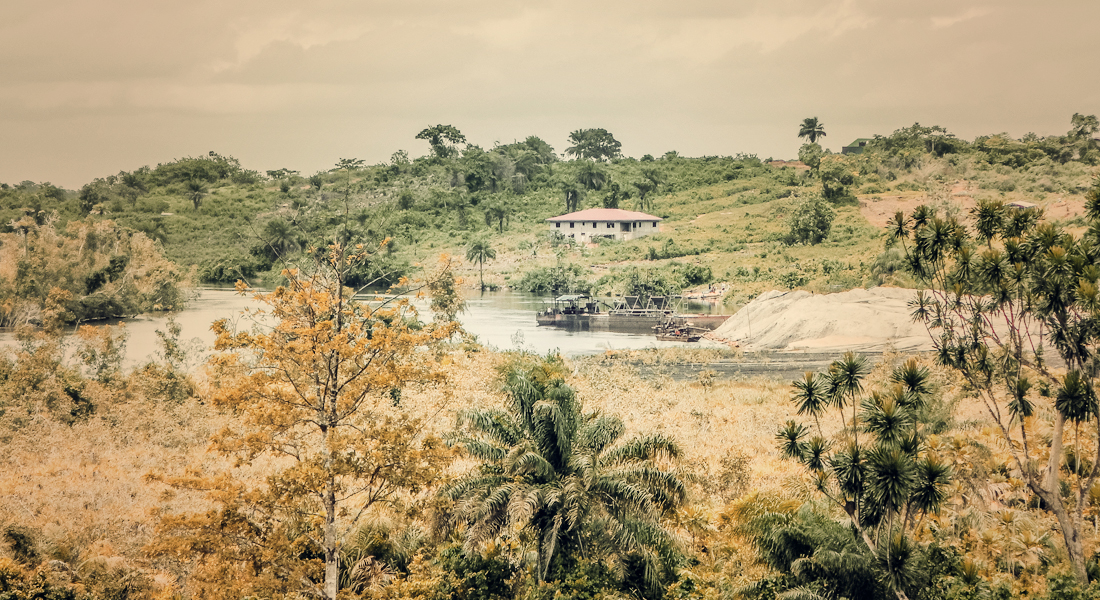WHAT SHOULD I CALL IT? Jungle? Rainforest? Forest? Wilderness? Luxuriant foliage? There is definitely no word that can precisely define where I am heading to in Liberia. Countryside could be an option, but that doesn’t quite do it for me either. Jungle? No, impossible, I can’t call it the jungle. That would be over the top. So let’s simply call it “bush”. There we go.
It’s just gone eight o’clock in the morning and I get into the international NGO’s Toyota Land Cruiser and we set off towards Gbarnga. The landscape is green and covered in trees. It’s pouring and you can hardly see through the rain. I’m exhausted; it feels as if a thorn is scratching at my iris. It’s actually just stress; just your usual minor mundane worries.
A beam of light penetrates the windscreen, I think; there must be some people passing by. I think; some human beings moving. I think. After a while, the driver realises that I’ve stopped mulling over everything and as we are approaching Kakata, forty-odd minutes into the journey, he smiles at me and shows me his teeth.
Or maybe I smiled at him first. And I am pretty sure that when I told him my age, he answered: “Carlos, you are very young.” Well thank you very much, mate! And so we proceed, surrounded by forests of forests, trees of trees, and occasionally crossing a river (oxygen), down an unpleasant road that takes us to Gbarnga.
What are the driver’s aspirations? If I remember correctly, it was to feed his children. That’s what he said, perhaps. I seem to remember his yellow smile now. Everything is yellow. And suddenly we find ourselves in Gbarnga, a very busy place, full of people, dust, pots and pans and many motorbikes. Our car moves forward and finds its way into the NGO’s compound.
Quite a lot of people walk in and out. And yet this part of Gbarnga is so laid back that it makes you want to lie face down and embrace the earth; embrace Gbarnga with both hands stretched out.
But instead of hurling myself onto the floor, I walk into the NGO’s premises and meet Pedro, the NGO’s programme coordinator who goes on to tell me all about the latest in Gbarnga and Bong county. “She’s the boss here, Taylor’s wife, the one everyone knows.”
Pedro explains further: “Gbarnga is Liberia’s thermometer. If things here start going pear-shaped, then Liberia’s ruined.”
He then introduces me to another NGO worker, Fred. Tall and the embodiment of calm but incredibly clumsy, Fred somehow makes you feel at ease every time he slips or is about to fall. Then we all go for lunch together at another compound. An empty hammock at the entrance soon startles me back to that blessed slowness and parsimony.
We swallow a piece of papaya, then a piece of mango, the softness against the teeth and as I stretch my hand out to pick up a fork, I see a woman in the kitchen, her back to us. For a few seconds I also spot her profile, a slow profile, turning like moving sands.
It’s soon afternoon and it’s time to get back into the Toyota, which takes us down a dirt track full of potholes for quite a while until we start descending into the village of Tolomai, another refuge of silence. Another secret.
There are a few dilapidated little houses, or rather an attempt of would-be little houses. We set foot on the ground (on the ground), and straight away we hear some other steps nearby, we can feel the breathing, and when my head gets the message from my brain to turn to the left, I discover the entire village walking towards us.
The entire village exudes a sense of expectation mixed with fear. Most of them carry machetes that swing like a pendulum over their knees. They get closer and surround us. I relax my face and smile; they smile back, and we greet each other with a click of the fingers, clack, clack.
A few of them stretch their hands out; they want dollars. Most of them smile again when I tell them in a friendly manner that it’s not happening.
I continue walking around with Fred and Alex (a Liberian NGO-worker who has just arrived) and we monitor the agricultural project together, to see what gets done in these forgotten corners of the world where not even oblivion finds a home.
My colleagues show me the pineapple and cassava plantations as well as the rice paddies, and a lot of burnt wood. All of that. The air, the breeze, the green. We walk on and on, past oblivions forgotten by oblivion itself, we walk listening to the soles of our feet crunching the tender ground. Sometimes.


Basic information on data protection: